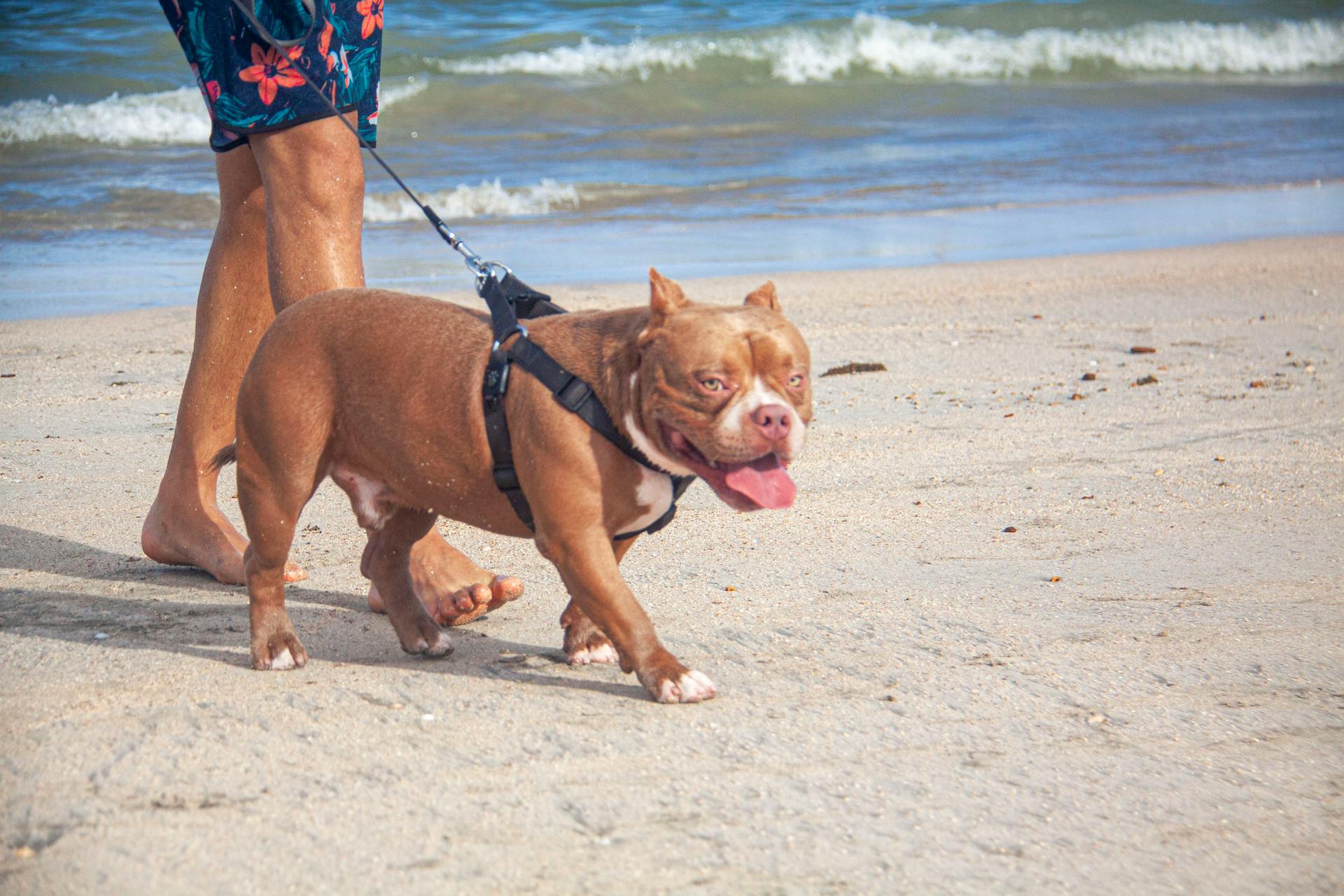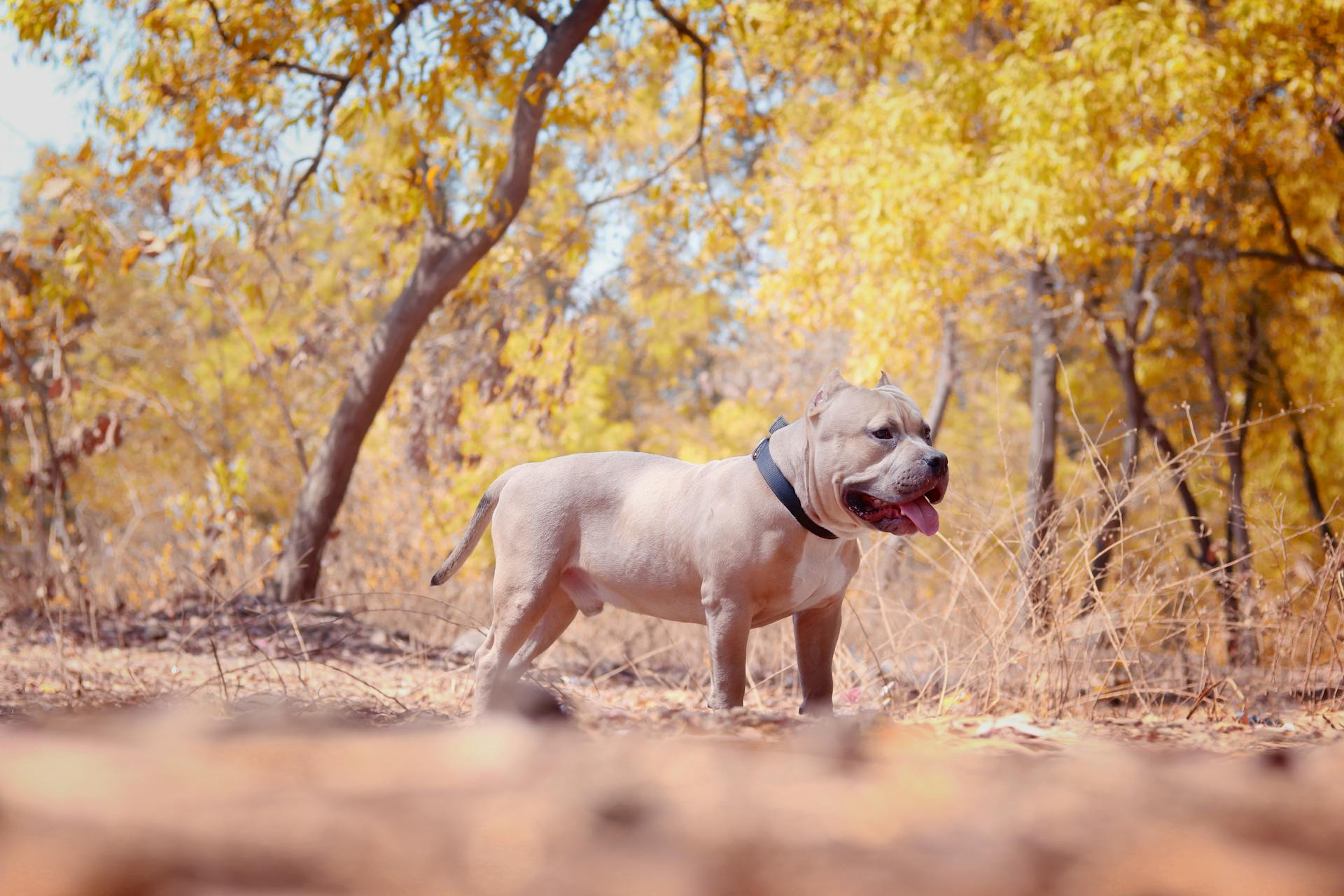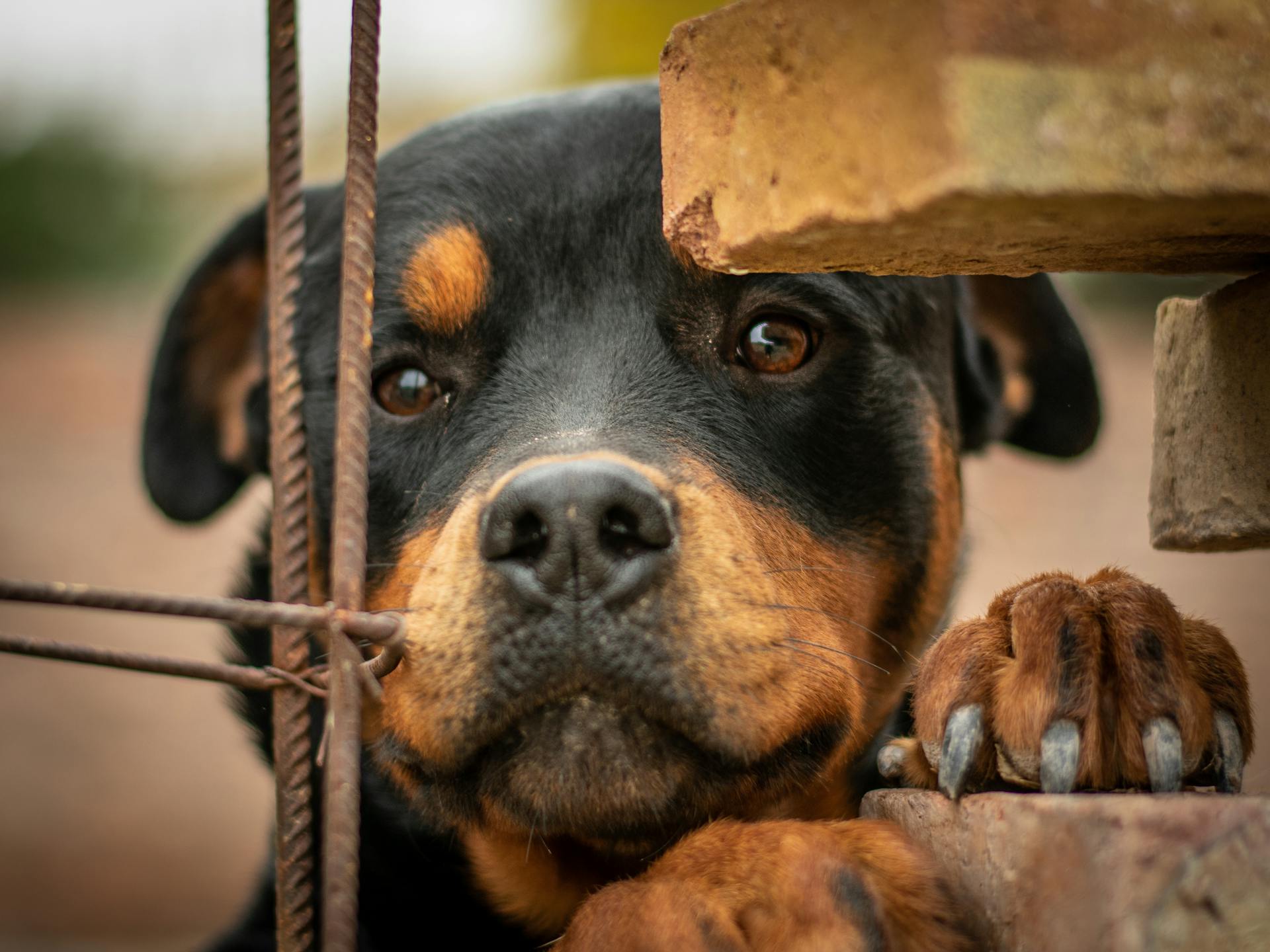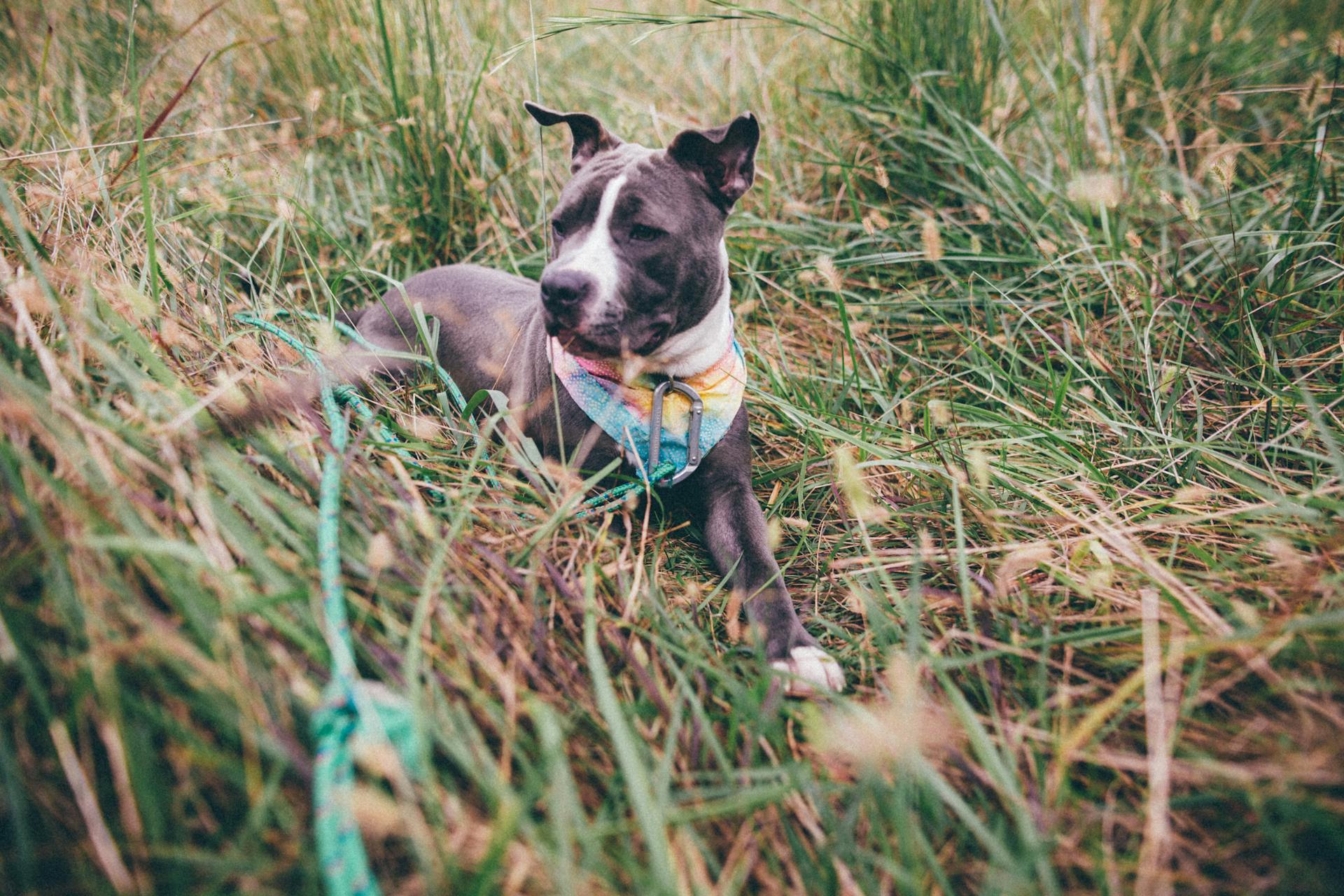
The American Pit Bull Terrier (APBT) is a breed that's often misunderstood. They originated in England in the 19th century as a cross between the Old English Bulldog and the Old English Terrier.
Their name "Terrier" comes from their original purpose as a fighting breed, specifically in the bloodsports of bull-baiting and ratting. They were valued for their tenacity and agility.
In 1898, the APBT was recognized as a distinct breed by the United Kennel Club (UKC), which is still one of the breed's primary registries today.
Breed Facts
The term "Pit Bull" is actually a generic term, not a specific breed. Pit Bulls can include American Pit Bull Terriers, American Staffordshire Terriers, and Pit mixes.
Pit Bulls are often misunderstood, but they are wonderful animals that deserve a chance to have a good life. They are a little more of everything a dog can be.
The history of Pit Bulls is not well-documented, especially for rescue dogs. Some may be game bred from fighting lines, while others may be registered show dogs.
Pit Bulls come in a variety of characteristics, but there is no way to know for sure about a dog's background unless you have its pedigree.
For more insights, see: Pit Bulls Should Not Be Banned
About the Temperament
Pit bulls are known for being dogs of extremes, and their temperament can vary greatly from one individual to another. They can be ideal companions for many people, being playful, willing to please, and moderately active.
Pit bulls are generally quiet in the house and are not prolific barkers, making them a great choice for people who live in apartments or have noise restrictions. They are also fair watchdogs and protectors, but their tendency to be reactive towards other animals is a common issue.
This reactivity is due to their Terrier breed, which was bred to hunt vermin. As a result, they may kill small animals and require a large amount of exercise and stimulation to keep them happy and healthy. If you're considering bringing a pit bull into your home, make sure you have a secure yard and are prepared to provide plenty of physical and mental stimulation.
Pit bulls are also known for being stubborn at times, but they are fast learners and can thrive with proper training and socialization. In fact, only 9% of behavior variation is attributed to the breed of the dog, so it's up to you to shape your pit bull's personality through training and experience.
A well-socialized pit bull can be an excellent family companion, but it's essential to wait until your children are older before bringing one home. They can be gentle, but their energetic nature and strong physique can lead to injuries during playtime. With patience, love, and proper training, a pit bull can be a loyal and loving member of your family.
Care and Training
Pit bulls need a secure, fenced yard for exercise, with strong and tall sides that can't be tunneled under. This breed is not well suited for dog parks, as they may fight with other dogs.
Extra care should be taken to ensure the fence is secure, with a breaking stick on hand in case of a fight. Pit bulls need leash walks and activities that engage both their mind and body, such as games, agility training, and scent work.
Pit bulls excel at weight pulling and may or may not like swimming. They need a consistent pack leader and regular dog training to manage their behavior and prevent problem behaviors.
Dog Care Tips
Pit bulls need a securely fenced yard to exercise, as they're athletic and tenacious. They'll appreciate time in the yard, supplemented with leash walks and activities that engage their minds and bodies.
A harness is a must for pit bull owners, as it limits the dog's ability to pull the handler. This will make walks and training sessions much more enjoyable for both you and your dog.
Coat care for pit bulls is minimal, requiring only occasional bathing and weekly brushing. You'll also want to keep an eye on their nails and ears, as regular hygiene is essential.
Pit bulls are generally great family dogs, but they do need proper leadership and training. With the right guidance, they'll be eager to please and lovable companions.
In warm climates, pit bulls will thrive, but if you live in a cold weather area, make sure to provide them with shelter from the cold elements. This will keep them happy and healthy.
For your interest: Will Shiba Inu Coin Reach .01
Training
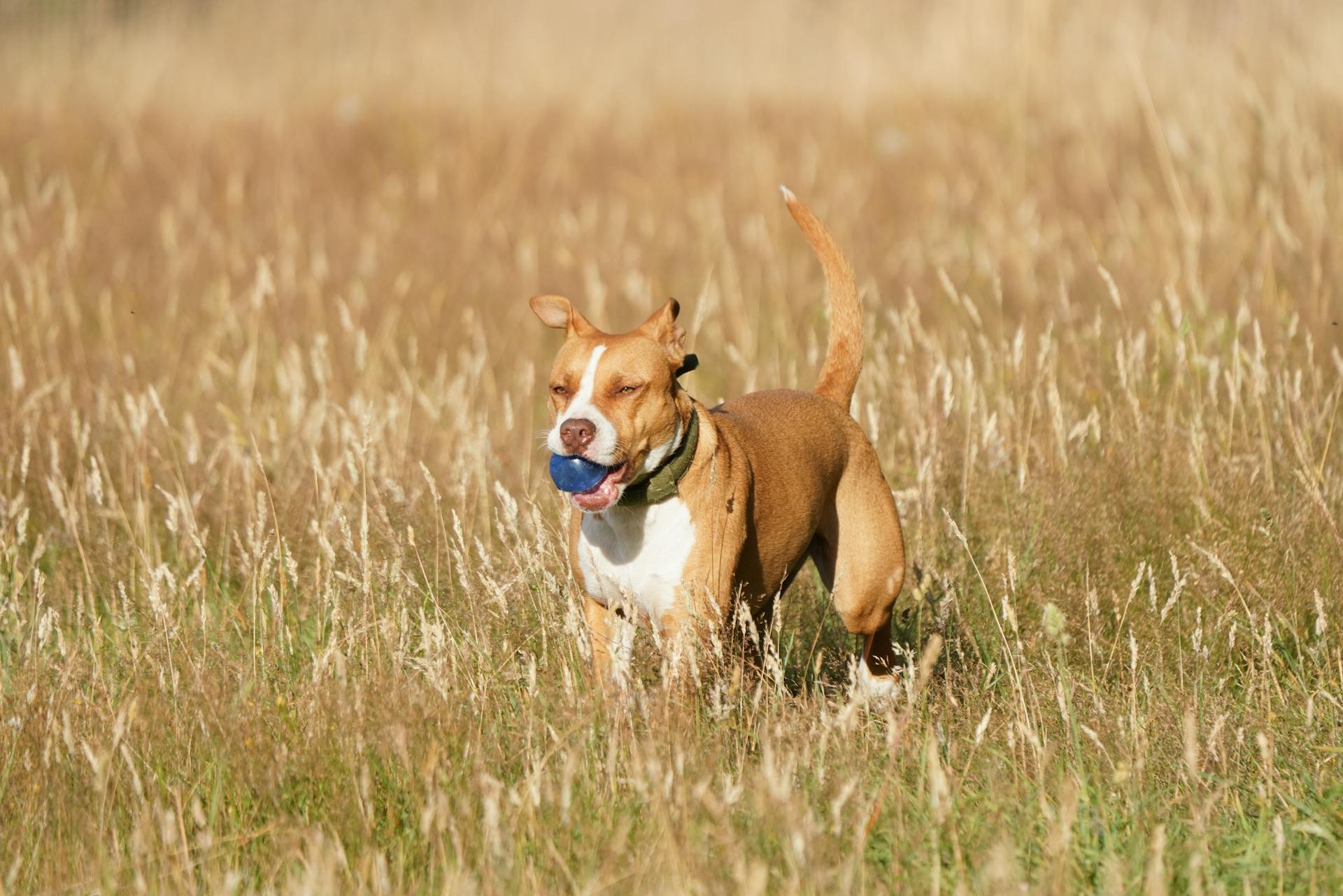
Pit bulls are very tenacious and stubborn at times, so they need a consistent pack leader in order to be well mannered pets.
Socialization is key, and it's essential to socialize them as early on as possible with all kinds of animals to alter or manage problem behaviors.
A regular training schedule is crucial, and it's best to set boundaries from an early age to improve their temperament and prevent misbehavior as they age.
The breed excels at weight pulling, which is a great way to engage their mind and body, but training is still necessary to manage their behavior.
If you're having difficulty training your dog, consider seeing a pet behavior consultant, as they can provide expert advice and guidance.
Pit bulls need to be consistently stimulated on a daily basis to make sure they're willing to work for real life rewards in everyday situations.
A breaking stick may be necessary in case of a dog fight, but with proper training, you can prevent such situations from arising.
Discover more: Signs of Old Age in Staffordshire Bull Terrier
Health and Grooming
Health and Grooming is a crucial aspect of owning an American Pit Bull Terrier. They have a low maintenance coat that requires only gentle brushing once a week.
Their short, straight hair sheds between seasons, so brushing frequency may need to be increased during these periods. However, with regular grooming, they can enjoy adventures like swimming, digging, and playtime in the mud without any issues.
To keep their teeth healthy, daily brushing is essential. Monthly nail checks and trims are also necessary to prevent overgrowth.
How Much Grooming Does a Pet Need?
American Pit Bull Terriers have relatively low maintenance coats, but they still need some regular grooming to stay healthy and happy. They should be brushed gently once a week to remove loose hair and dust.
Their short, straight hair means they're suitable for indoor and outdoor living, but they may shed between seasons, requiring more frequent brushing during those times. They're not hypoallergenic, but can be better for hayfever sufferers than long-haired breeds.
To keep their teeth healthy, brush them every day. This simple habit will help prevent dental problems down the line. You'll also need to check their nails monthly and trim them when they get too long.
Their ears can get waxy and dirty, so it's essential to check them every few weeks to ensure there's nothing abnormal. With regular grooming, your American Pit Bull Terrier will be happy and healthy.
You might enjoy: Shiba Inu Coin 1 Cent
Vet Check
A healthy dog is a happier dog, and regular vet checks can help ensure that's the case. Get your dog checked out to keep them happy and healthy.
Make sure your dog's immunizations are up to date, especially if there are other dogs around, to avoid spreading viruses or fleas.
Your vet can check your dog for potential health issues and discuss any behavioral concerns you may have.
A healthy, calm, confident, and well-groomed dog will feel welcome in the neighborhood and get along with the other furry residents.
A unique perspective: Healthy Bull Terrier
Ownership and Suitability
American Pit Bull Terriers are a great fit for active owners who enjoy exercising with their pets. They thrive on regular physical activity and will eagerly await your return after a few hours alone.
These loyal companions can make good family pets when trained and socialized early, but they're better suited for families with older kids rather than toddlers and babies. They're adaptable to different living environments, but do require a home with a backyard to meet their exercise needs.
They can thrive on a smaller property as long as their exercise needs are met, but they're not always the best choice for a home with other pets.
Discover more: How Much Exercise Does a Bernese Mountain Dog Need
Who is Best Suited?
If you live an active lifestyle, an American Pit Bull Terrier could be a great fit for you. They need owners who are prepared to exercise them regularly.
These dogs are companions and want to spend time with you, so they'll eagerly await your return if you're away for a few hours. They thrive on interaction and attention from their owners.
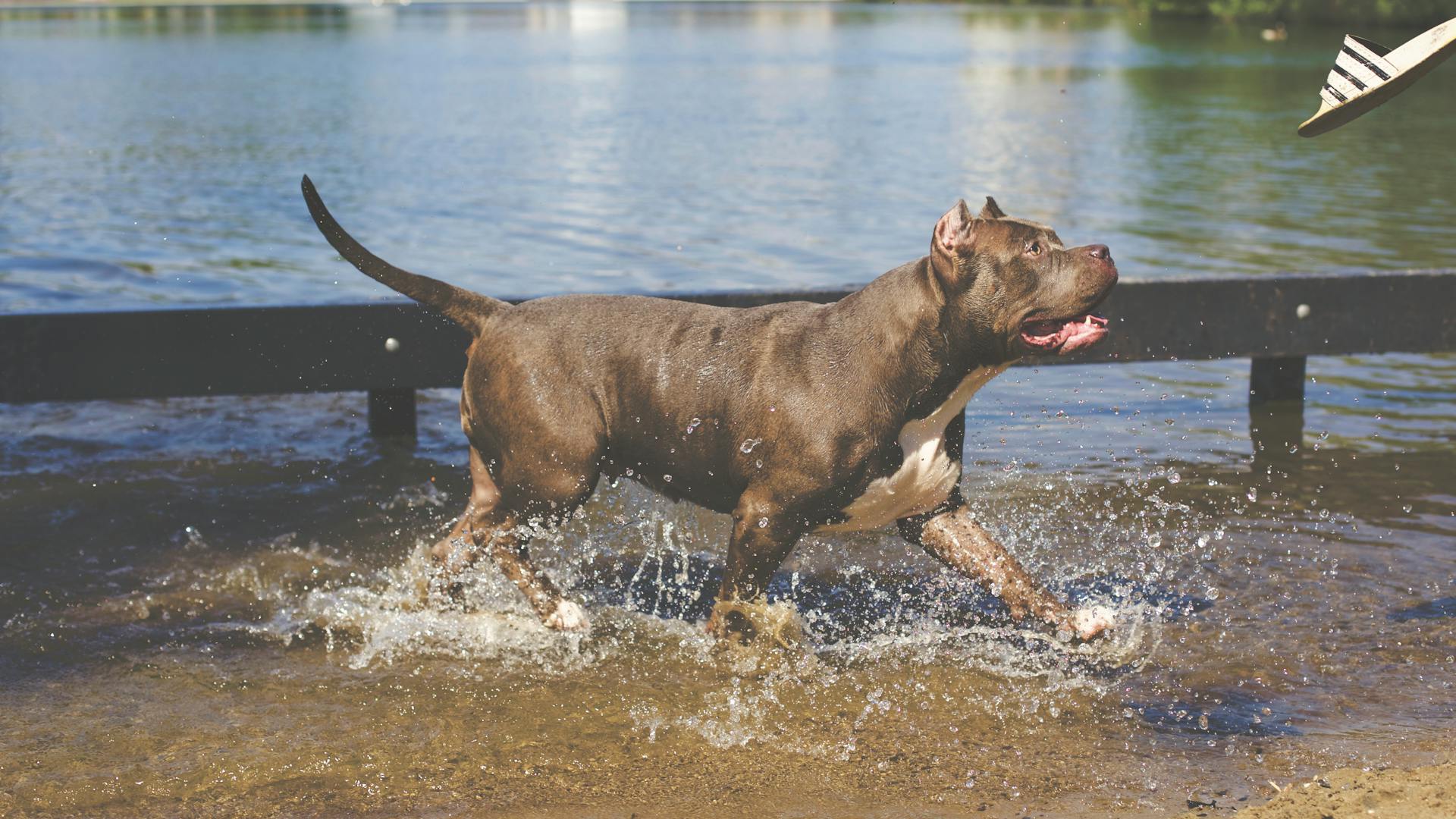
They can make good family pets, but it's best to consider them for families with older kids rather than toddlers and babies. Early training and socialization are key to their success in a family setting.
American Pit Bull Terriers can adapt to different living environments, but they do need a home with a backyard. This is because they're active dogs that require regular exercise and playtime.
Rental Property Tips
American Pit Bull Terriers have a bad reputation due to their history of being raised as fighting dogs, making it difficult to secure a rental with one.
They can make excellent pets with proper training and socialization, and most of them don’t deserve this stigma.
You can get a rental property without giving up your pet by following top tips.
Precautions
Before making a decision, it's essential to consider the potential risks and liabilities associated with owning a particular type of pet. This includes understanding the specific needs and requirements of the animal, as well as any potential health risks to humans.
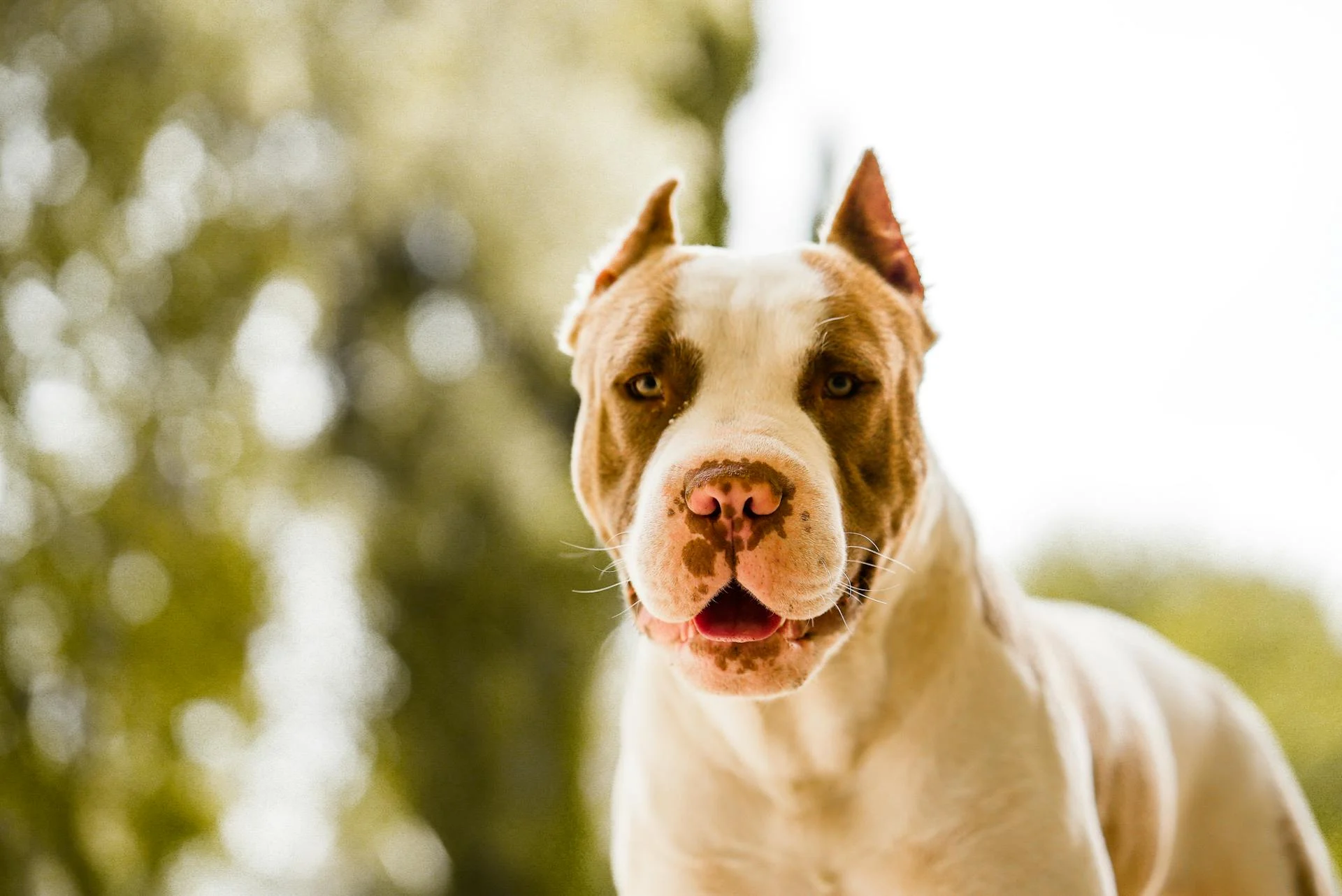
Some pets, like reptiles, can carry salmonella bacteria, which can be transmitted to humans through contact with their habitat or handling them. This is especially concerning for young children, older adults, and people with weakened immune systems.
It's also crucial to research the local laws and regulations regarding exotic pets, as some may be prohibited or require special permits. For example, in some areas, owning a ferret may be restricted due to concerns about their potential impact on local wildlife.
In addition, some pets may require specialized care or housing, such as birds that need large cages or primates that require complex social interaction.
For another approach, see: Can Pit Bulls Make Good Pets
Genetics and Background
A dog's background can greatly impact their personality, and it's not just about the breed. A puppy raised in a loving home will be more sociable, while a dog with a history of neglect or fighting may show aggressive behavior.
Around 25% of a dog's behavioral traits are inherited from their parents, so genetics play a significant role in shaping their temperament. This means that a purebred American Pit Bull Terrier from a reputable breeder may have a calmer temperament than one from a line of dogs bred for fighting.
If you're adopting a rescue pet, you'll need to be extra vigilant and monitor their behavior for signs of distress or agitation, as their background may be harder to determine.
For more insights, see: Shiba Inu Background
Background
The background of your dog can greatly impact their personality and behavior. This is especially true for breeds like the American Pit Bull Terrier, which have a history of being bred for fighting.
You should consider where your dog came from and what their life was like before they came to you. If you adopted your American Pit Bull Terrier as a puppy, they will have grown up around your family and you'll know exactly how they've been raised.
Genetics
Genetics plays a significant role in a dog's temperament, with around 25% of behavioral traits inherited from the parents.
A dog's genetics can also impact its health, with reputable breeders less likely to pass on ongoing health conditions.
A purebred American Pit Bull Terrier from an experienced trainer may have a calmer temperament than one born from a line of dogs that have been bred to fight.
Choosing a reputable breeder is crucial in ensuring your dog's health and temperament.
Frequently Asked Questions
How much is a real American Pit Bull Terrier?
The cost of an American Pit Bull Terrier puppy typically ranges from $500 to $2,000, depending on the breeder's reputation and the puppy's ancestry. Learn more about the factors that affect the price of this breed.
What two breeds make an American Pit Bull Terrier?
The American Pit Bull Terrier is a breed developed from crosses between the Old English Bulldog and the Old English Terrier. This combination of breeds formed the foundation for the 19th-century British bull and terrier, a precursor to the modern Pit Bull-type dogs.
Sources
- https://www.britannica.com/animal/pit-bull
- https://www.animalbehaviorcollege.com/blog/pet-training/breed-spotlight-the-american-pit-bull-terrier/
- https://love-a-bull.org/resources/the-history-of-pit-bulls/
- https://vrcpitbull.com/pit-bull-facts/
- https://www.petscreening.com/blog/what-you-need-to-know-about-the-american-pit-bull-terriers-temperament
Featured Images: pexels.com
